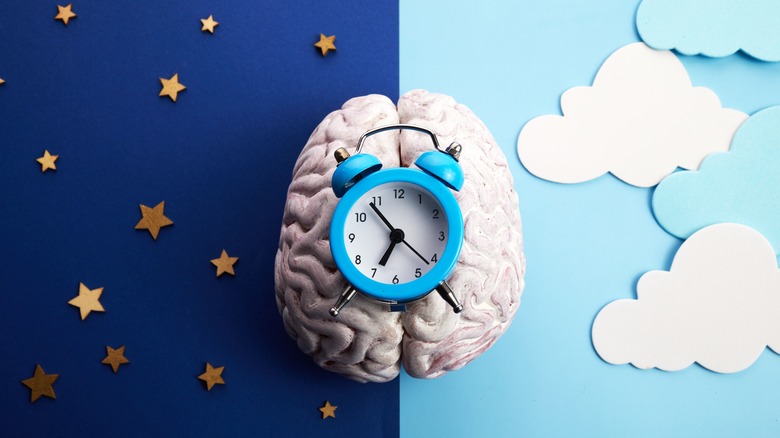Late-night snacking is often blamed for weight gain, bad sleep, or poor digestion. The Cleveland Clinic doesn’t recommend eating cereals, chips, sweets, and other carb-loaded foods before bed, as they could ruin your sleep — and your waistline. “Cookies, candy bars, and anything high in refined sugar will reduce your serotonin levels, making it harder for you to fall asleep,” explained registered dietician Julia Zumpano. But some snacks are better than others and might actually help you catch more Zzz’s.
The research is conflicting, though. According to a 2024 review, snacking before bedtime or late at night may affect the peripheral circadian clocks, which influence immune and metabolic functions, among other processes. The researchers advise against late-night snacking and recommend eating your last meal of the day before 8 PM, notes the journal Nutrients.
Zumpano, on the other hand, says late-night snacking isn’t necessarily a bad habit. What matters most is choosing foods that “calm your body and prepare you for sleep,” she told the Cleveland Clinic. With that in mind, let’s take a closer look at the connection between what you eat at bedtime and sleep quality.
Bedtime snacking could be the key to a good night’s sleep

Dr. Scott Beyer, a chiropractic neurologist based in Illinois, made headlines after sharing a controversial sleep hack on his TikTok channel. His advice for those who wake in the middle of the night and have trouble falling back asleep is to “actually eat very close to bed.” Ideally, he says, you should snack on high-fat and high-protein foods before heading to sleep and then eat again first thing in the morning.
According to Dr. Beyer, the stress hormones cortisol and adrenaline might be to blame for disrupted sleep. In normal circumstances, cortisol regulates the stress response, blood sugar, blood pressure, and other biological processes, explains the Cleveland Clinic.
Its levels increase throughout the night, and reach their peak in the morning, says Dr. Beyer. However, prolonged stress can sometimes affect cortisol secretion, causing the body to release adrenaline instead, a hormone that stimulates the central nervous system.
Based on this premise, Dr. Beyer states that eating late at night and early in the morning for a couple of weeks can “take a load off of the demand for blood sugar regulation”, leading to better sleep. Protein and dietary fat are particularly beneficial, he says.
The above recommendations make sense in theory, but things are not that simple. Here’s why.
What does the research say?
High-fat foods can be difficult to digest and may cause heartburn, affecting your sleep, says Dr. Joseph Murray, a gastroenterologist at the Mayo Clinic. He also explains that simply eating late can increase gastric acid production, trigger reflux, and keep you awake. To prevent these issues, eat your last meal or snack about three hours before hitting the sack.
However, the National Library of Medicine notes that light snacks before bed can actually be helpful for some people. Sleep medicine physician Ian S. Katznelson recommends snacking on foods rich in tryptophan, melatonin, or complex carbs (via Northwestern Medicine).
For instance, lean cheese and other dairy products can help you fall asleep faster due to their high melatonin content. This compound is also found in black rice, strawberries, cherries, grapes, peppers, seeds, and other common foods, reports a 2024 review featured in the journal Nutrients.
Tryptophan, on the other hand, stimulates the production of serotonin, which regulates sleep and mood. In one study, men and women who ate tryptophan-enriched cereals at breakfast and dinner slept better and longer at night, according to the journal Age. This amino acid occurs naturally in foods, such as milk, cheese, turkey, and pumpkin seeds, notes the National Library of Medicine.
But again, late-night snacking may or may not work for you, and it isn’t guaranteed to improve your sleep. If you have nighttime heartburn or stomach pain, you might be better off kicking this habit and eating an early dinner.